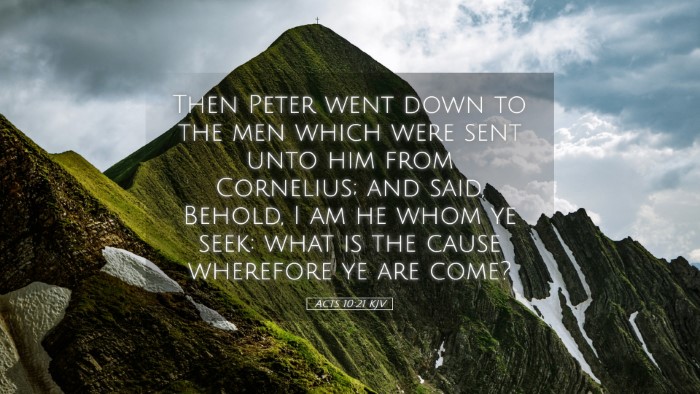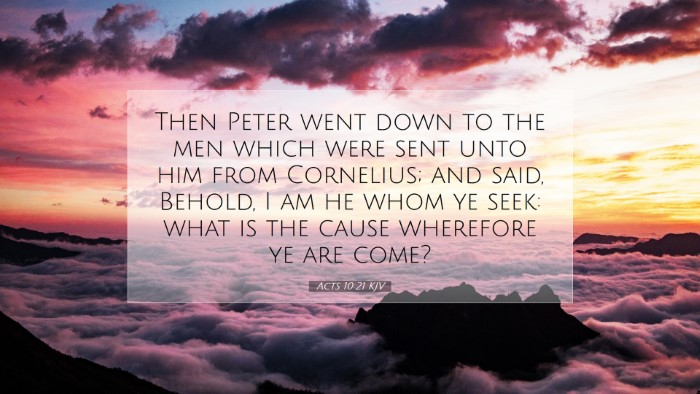Commentary on Acts 10:21
Acts 10:21 reads, "Then Peter went down to the men which were sent unto him from Cornelius; and said, Behold, I am he whom ye seek: what is the cause wherefore ye are come?" This verse marks a pivotal moment in the early Church, illustrating the divine orchestration of events leading to the inclusion of the Gentiles in the Christian faith. Below, we provide a summary of insights from various public domain commentaries including those of Matthew Henry, Albert Barnes, and Adam Clarke.
Contextual Background
The background of this passage involves a significant shift in the early Church’s understanding of God’s plan for salvation. Prior to this event, the Gospel was primarily preached to the Jews. Cornelius, a Roman centurion, was a God-fearing Gentile whose prayer and almsgiving had ascended as a memorial before God. Peter’s interaction with Cornelius’s emissaries symbolizes the breaking down of barriers between Jews and Gentiles and aligns with the Great Commission in Matthew 28:19.
Peter's Response
Matthew Henry remarks on Peter's immediate obedience to God's directive through visions and the Holy Spirit’s prompting. Peter discerned the importance of the visit from Cornelius as part of God’s sovereign plan. His self-identification, "Behold, I am he whom ye seek," indicates his readiness to fulfill his role in this divine mission.
Albert Barnes highlights the notion of providence in Peter’s response. He emphasizes that Peter did not question the purpose of the visit even though he was aware of the cultural and religious implications. This example illustrates a vital principle in theological methodology, where faith often precedes full understanding.
Adam Clarke adds that Peter’s actions reflect a breakthrough in recognizing that the Gospel transcends traditional Judaism. Clarke elaborates that Peter’s greeting and inquiry into the cause of the visit signal the ushering in of a new understanding of community within the faith.
Theological Implications
The events surrounding Acts 10:21 underscore significant theological themes:
-
Inclusivity of the Gospel: The verse supports the doctrine that the Gospel is for all humanity, as it breaks ethnic and cultural barriers.
-
Divine Purpose: The orchestration of circumstances signifies that God is actively working in the hearts of individuals to prepare them for His message of salvation.
-
Obedience to the Holy Spirit: Peter’s compliance illustrates the necessity of following the Holy Spirit's guidance in ministry and evangelism.
Application for Ministers and Theologians
As ministers and theologians reflect on Acts 10:21, several applications emerge:
- Embrace diversity: Churches should actively seek to reach diverse communities, recognizing that the Gospel is not bound by cultural or ethnic constraints.
- Be responsive to God’s leading: Just as Peter was attentive to the Spirit, modern believers are encouraged to remain open to divine direction in their own contexts.
- Facilitate understanding: Pastors should commit to educating congregants about the historical context of Scripture to promote a more profound appreciation of God’s inclusive plan.
Conclusion
Acts 10:21 serves as a crucial turning point in the book of Acts, demonstrating God’s unwavering commitment to extending grace to all people. The combined insights from the commentaries of Matthew Henry, Albert Barnes, and Adam Clarke offer deep, meaningful reflections that challenge and inspire believers today. In the light of this verse, the Church is reminded of its mission to inclusively bring the message of Christ to the world, empowered by the Holy Spirit.


